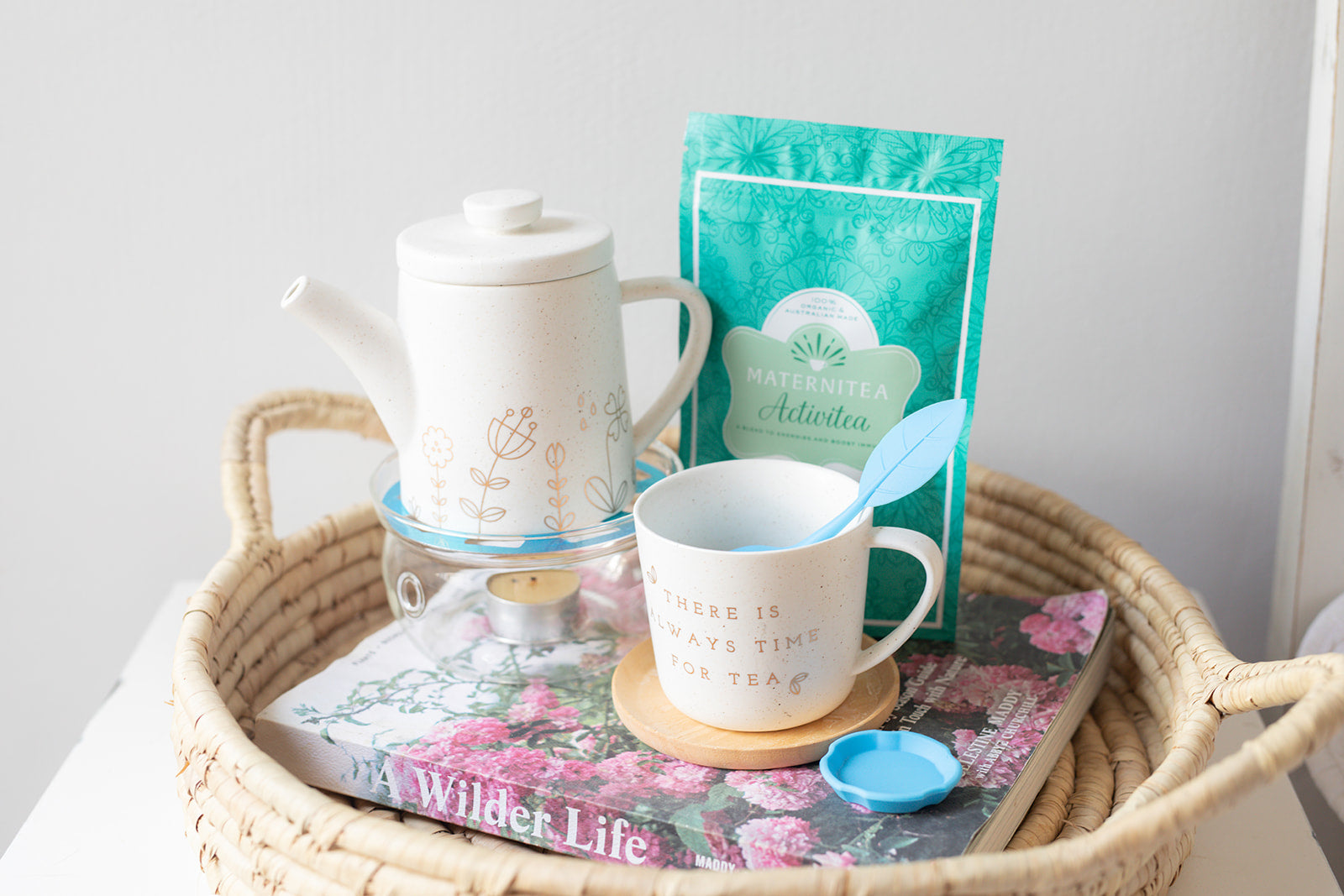Caffeine During Pregnancy & Breastfeeding

If you’re a Mum or Mum-to-be, chances are you’ve already started wondering about caffeine and the effects it can have on you, your pregnancy and your baby.
Firstly, let’s take a look at what caffeine is and what effect it has on us as adults.
CAFFEINE – A LEGAL DRUG
Caffeine is a central nervous system stimulant, it’s the world’s most widely consumed psychoactive drug. Examples of other psychoactive drugs include alcohol, cocaine, and cannabis. Psychoactive drugs are chemical substances that change the brain function and can result in alterations of things like perception, behaviour, mood, consciousness or cognition.
Unlike many of the other psychoactive drugs, Caffeine is legal and is largely unregulated in most part parts of the world. Once consumed, caffeine is really quickly absorbed from the gut into the bloodstream, from there it travels through to the liver where it is broken down into compounds where it can affect the function of different organs in the body, however its main effect tends to be on our brain.
HOW CAFFEINE AFFECTS THE BODY
How this works is by blocking the effects of adenosine which is a neurotransmitter that relaxes our brain and can make you feel tired. Normally, adenosine levels will naturally build up over the course of the day making you increasingly more tired until of course it’s night time and you’re ready to go to sleep. Caffeine however helps you stay awake by cleverly connecting the adenosine receptors in the brain without actually activating them.
The effect of caffeine is usually quite fast, for example the amount of caffeine in a regular cup of full-strength coffee can take as little as 20 minutes to reach your bloodstream and about an hour to reach is maximum potential.
PREGNANCY AND BREASTFEEDING
Because caffeine is a stimulant, it increases your blood pressure and your heart rate, of which both are NOT recommended during pregnancy. Caffeine also increases the frequency of urination (as if we pregnant mamas need any more trips to bathroom) this causes a reduction in your body fluid levels which can lead to dehydration, remember it’s really important to stay extra hydrated during pregnancy and breastfeeding as our body needs this fluid for the increased blood volume required to make a baby and to create and replenish amniotic fluid and breastmilk.

WHAT DOES CAFFEINE DO TO MY BABY
So, if we think about how caffeine makes us feel for a moment, that buzz, that increased heart rate and energy level, if we have too much we can feel a bit jittery and shaky. Luckily for us as fully mature adults we have the physical ability to breakdown the toxins – the caffeine, in our liver and dispose of the waste after a few hours. However, let’s think about your tiny growing baby. Everything that you eat and drink during pregnancy and breastfeeding is passed through to your baby either via the placenta or breastmilk. Although you may be able to handle the amount of caffeine you feed your body – your baby cannot.
Your baby’s metabolism is still maturing and does not have the liver function capable of metabolising (breaking down) the toxins, it can take a baby from newborn to about 4 months of age up to 100 hours to break down the caffeine in their system. In addition, their tiny little heart is forced to increase and bubs does not have the ability to process the caffeine the same way, so it can cause these toxins to build up in their system.
WHAT WILL THIS LOOK LIKE
Any amount of caffeine can cause changes in your baby’s behaviour and sleep pattern. Remember caffeine is a stimulant, so it can keep both you and your baby awake. It’s also important to note that caffeine can inhibit the absorption of iron and other vital vitamins and minerals like calcium & magnesium. It’s already a challenge during pregnancy to get sufficient amounts of those nutrients from the foods and supplements we eat, with such a high percentage of pregnant women already iron deficient, the last thing we want is to be blocking those nutrients from reaching you and your baby’s bloodstream.
Too much caffeine and exposure during pregnancy can lead to a low birth weight for baby and health conditions later in life.
TRYING TO CONCEIVE?
What about when you’re trying to fall pregnant? Can caffeine really affect fertility? The answer is YES. Caffeine can cause stress and anxiety levels which can produce the cortisol hormone which can inhibit fertility. For women trying to conceive, caffeine also has other consequences, it can decrease the flow of blood to the uterus which can interfere with implantation, too much caffeine can increase the risk of blood clotting and miscarriage.
HOW CAFFEINE EFFECTS BREASTFED BUBS
After cutting out your daily coffee during pregnancy for nine months, many a tired new Mum will find themselves desperately seeking out a cafe latte or similar once bubs comes along, but something to look out for and consider is when caffeine enters your bloodstream it passes through to the breastmilk and through to bub, this can cause a reaction and cause bub to become extra fussy or unsettled and because they struggle to break down the caffeine, they may experience tummy pains, wind and general digestive upset.
As a new Mum, if you’re unaware of the potential implications of caffeine you may not connect the two and find yourself scrambling for answers to your bubs distress, perhaps wrongly putting it down to colic or reflux, a bad sleeper, teething pain etc and the truth is it might be as simple as cutting out that daily cup of caffeinated coffee. Keep in mind the concentration of the amount of caffeine that enters your breastmilk will actually peak around 2 hours after you’ve consumed it.
HOW MUCH CAFFEINE IS IN THERE
Here’s a little rough guide as to how much caffeine is found in some regular beverages and food:
A barista style coffee – up to 160mg caffeine per serve
A Yerba Mate – up to 120mg caffeine per serve
Energy Drinks – up to 160mg caffeine per serve
Black Tea – up to120 mg caffeine per serve
Soft drinks – up to 40mg caffeine per serve.
Lets not forget chocolate and all those yummy snacks that contain bits of caffeine, it all adds up and the daily recommended maximum intake is 200mls. Remember even 200mls can have a real impact.
WHAT ABOUT DECAF?
A great choice – or is it? If you look closely at most supermarket or barista style decaffeinated coffees, you’ll find they’ve been decaffeinated using chemicals. This can leave a bitter or metallic aftertaste and it means your also consuming products that have been chemically altered, not good for you or your bub.
HELLO MAMA BREW! COFFEE FOR PREGNANT & BREASTFEEDING MAMAS
At MaterniTea we are all about supporting our Mums and Mums- to-be with healthy, safe and supportive ingredients that not only have wonderful health properties but taste amazing. Mama Brew is a coffee for pregnant and breastfeeding women. It is a single origin decaffeinated Ethiopian coffee blend that has been decaffeinated using a gentle swiss water wash process NOT chemically decaffeinated, meaning no chemical nasties for you or your baby. And if that’s not enough, we’ve added wonderfully nourishing collagen peptides, essential for bubs bone development, ligaments and joints and your stretching and recovering skin cells, tissues and joints.
We also know how busy and tiring pregnancy and breastfeeding can be, so this incredible coffee blend is conveniently served in individually wrapped coffee bags that act just a tea bag, pop it into your cup or mug, add boiling water allow to brew for a few minutes then add milk or sugar to taste – it’s so simple and so effective. Your daily coffee without the nasties.

-
Posted in
Maternitea Blog Post






